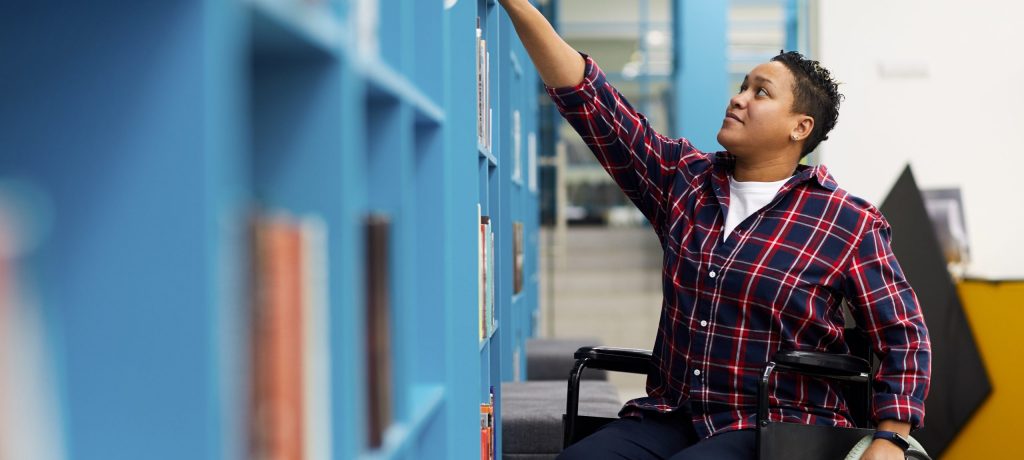Information Library
Start Reading

The Care Center for Persons with Disabilities has been serving adult patients with a wide variety of disabilities ever since its opening in January 2020. At Penn Dental Medicine, patients are able to book appointments with a special needs dentist for comprehensive dental specialties and services. The 3,500-square-foot Care Center for Persons with Disabilities is located on the second floor of the Robert Schattner Center. The facility is designed to fully accommodate a population that has been largely underserved, according to Penn Dental Medicine Morton Amsterdam Dean Professor, Dr. Mark Wolff.
“Around 16 percent of our local family, friends, and neighbors have a disability,” Wolff says. “That’s roughly a quarter million people. And, when a patient suffers any of a number of disabilities, access to good dental care can become exponentially more challenging.”
It was around 2005, when Dr. Wolff, came to a greater understanding of just how challenging it was for families in need of a dentist for special needs.
“I realized that all dentists didn’t walk away with extensive training in how to manage persons with disabilities,” Wolff says. “And, I realized that that was a core deficiency in ‘how-to.’”
Wolff adds, that while all dental schools are mandated by the Commission on Dental Accreditation to provide students with an education on how to manage persons with disabilities, Penn Dental Medicine is going beyond “just an education, to look for students to have competence and a comfort zone for being able to do so.”
 While families in need of dentists for special needs adults and children require quality, comprehensive dental services, they also need a reliable source for ongoing care—and, education on how to continue optimal dental hygiene practices from home.
While families in need of dentists for special needs adults and children require quality, comprehensive dental services, they also need a reliable source for ongoing care—and, education on how to continue optimal dental hygiene practices from home.
“We want this center to focus on how we can find the accommodations that will sustain people in health for very long periods of time,” Wolff explains. “It may mean seeing us much more frequently than you would imagine.”
Serving as a supervisor and dentist for children with disabilities and adults with special needs since 1982, Wolff recalls experiencing a subtle realization. “What I started to understand is that children with developmental disabilities become adults with developmental disabilities. Adults with psychiatric, Alzheimer’s disease, and significant medical conditions have very few dentists that are comfortable treating them.”
He also remembers an incident that helped him more clearly comprehend the importance of accommodating “the individual” in special needs dentistry. Wolff goes on to recall a time when a dental hygienist was busy providing dental treatment to a particularly large patient, in his twenties, in a motorized wheelchair, and said to the young man’s mother, “This is how you’re going to brush his teeth.”
The mother’s reply was what Wolff considers a significant “ah-ha moment.” She said: “It sometimes can take me an hour to an hour and a half in the morning to get him cleaned, groomed, and fed to get ready to go to his day treatment center. Can I do this tooth brushing at a different time of day? I just can’t wake up any earlier to do this.”
At that moment, Wolff says he noted that “While we were giving the right instruction, we really weren’t providing the patient’s mom the ability to do it herself. So instead, she’s going to shrug her shoulders and say, ‘I did the best I could.’”
After his discovery, Wolff remedied his approach, and now helps students do the same. “And, over the 30 years of treating this adult,” Wolff says, “his mom actually was able to manage to keep the teeth clean.”
While persons with disabilities and their family members will receive the best level of dental care at the new center, their support network and caregivers are also able to gain special skill sets and approaches to help those they care for achieve best oral hygiene outcomes from home.
“As the only such resource in the region, the new Care Center for Persons with Disabilities will be a gamechanger,” Wolff says. “Patients overlooked for too long will be underserved no longer. Our students will be even better prepared to care for such patients. And, the center will help us research and pioneer new oral health care innovations.”
Patients that require special needs dental services (and their family members) aren’t the only ones who will benefit from the Care Center for Persons with Disabilities. Dental students and dental graduate students, under the supervision of faculty, will spend approximately 10% of their clinical education time treating patients with a variety of medical and physical intellectual abilities.
“Clearly this will be a major center for Penn Dental Medicine. Patients nationwide and worldwide will benefit from the education that our graduates will have,” Wolff says. “And, they’ll be able to start delivering care to patients in their own practice that come from their own communities, using the skills that we give them.”
The Care Center for Persons with Disabilities is currently accepting new appointments. To make an appointment, reach out here. Or, call our dedicated special needs dentistry line at 215-898-8180.